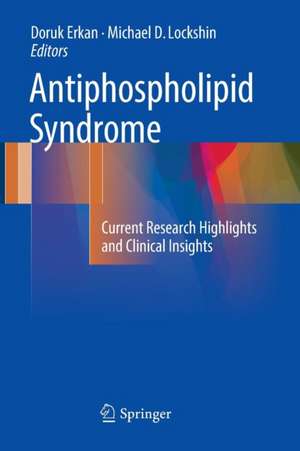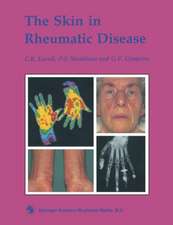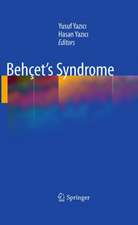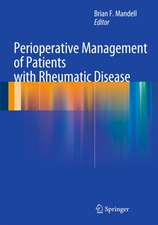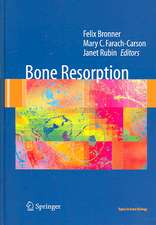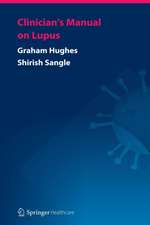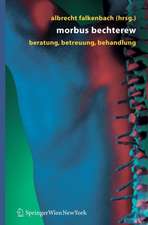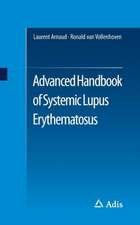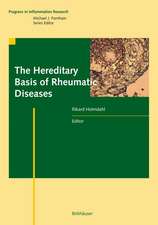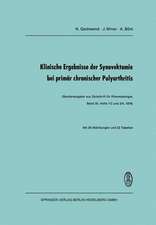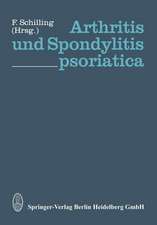Antiphospholipid Syndrome: Current Research Highlights and Clinical Insights
Editat de Doruk Erkan, Michael D. Lockshinen Limba Engleză Paperback – 12 aug 2018
| Toate formatele și edițiile | Preț | Express |
|---|---|---|
| Paperback (1) | 721.05 lei 6-8 săpt. | |
| Springer International Publishing – 12 aug 2018 | 721.05 lei 6-8 săpt. | |
| Hardback (1) | 1043.42 lei 6-8 săpt. | |
| Springer International Publishing – 21 iun 2017 | 1043.42 lei 6-8 săpt. |
Preț: 721.05 lei
Preț vechi: 758.99 lei
-5% Nou
Puncte Express: 1082
Preț estimativ în valută:
137.99€ • 142.36$ • 116.79£
137.99€ • 142.36$ • 116.79£
Carte tipărită la comandă
Livrare economică 05-19 martie
Preluare comenzi: 021 569.72.76
Specificații
ISBN-13: 9783319856629
ISBN-10: 3319856626
Pagini: 372
Ilustrații: XX, 372 p. 18 illus., 16 illus. in color.
Dimensiuni: 155 x 235 mm
Greutate: 0.55 kg
Ediția:Softcover reprint of the original 1st ed. 2017
Editura: Springer International Publishing
Colecția Springer
Locul publicării:Cham, Switzerland
ISBN-10: 3319856626
Pagini: 372
Ilustrații: XX, 372 p. 18 illus., 16 illus. in color.
Dimensiuni: 155 x 235 mm
Greutate: 0.55 kg
Ediția:Softcover reprint of the original 1st ed. 2017
Editura: Springer International Publishing
Colecția Springer
Locul publicării:Cham, Switzerland
Cuprins
SECTION 1 – HISTORICAL ASPECTS OF ANTIPHOSPHOLIPID SYNDROME.- History of Antiphospholipid Antibody.- SECTION 2 – BASIC SCIENCE ASPECTS OF ANTIPHOSPHOLIPID SYNDROME.- Natural Proteins Involved in Antiphospholipid Syndrome.- Origin of Antiphospholipid Antibodies.- Recent Advances in Understanding of the Genetics of Antiphospholipid Syndrome.- Mechanisms of Antiphospholipid Antibody-mediated Thrombosis.- Mechanisms of Antiphospholipid Antibody-mediated Pregnancy Morbidity.- Definition and Epidemiology of Antiphospholipid Syndrome.- SECTION 3 – CLINICAL & DIAGNOSTIC ASPECTS OF ANTIPHOSPHOLIPID SYNDROME.- Clinical and Prognostic Significance of Non-criteria Antiphospholipid Antibody Tests.- Disease and Risk Measurement Criteria in Antiphospholipid Syndrome.- Neuropsychiatric Manifestations of Antiphospholipid Syndrome.- SECTION 4 – THERAPEUTIC ASPECTS OF ANTIPHOSPHOLIPID SYNDROME.- Prevention and Treatment of Thrombotic Antiphospholipid Syndrome.- Prevention and Treatment of Obstetric Antiphospholipid Syndrome.- Treatment of Non-criteria Manifestations in Antiphospholipid Syndrome.- Antiphospholipid Syndrome Alliance for Clinical Trials and InternatiOnal Networking (APS ACTION).- SECTION 5 – 15th INTERNATIONAL CONGRESS ON ANTIPHOSPHOLIPID ANTIBODIES TASK FORCE REPORTS.- 15th International Congress on Antiphospholipid Antibodies - Task Force on Antiphospholipid Syndrome Classification Criteria Report.- 15th International Congress on Antiphospholipid Antibodies - Task Force on Pediatric Antiphospholipid Syndrome Report.- 15th International Congress on Antiphospholipid Antibodies - Task Force on Catastrophic Antiphospholipid Syndrome Report.
Notă biografică
Doruk Erkan, MD, MPH, Associate Attending Physician, Associate Professor of Medicine, Department of Rheumatology, Hospital for Special Surgery, Weill Cornell Medicine, New York, NY, USA, Michael D. Lockshin, MD, Attending Physician, Professor of Medicine and Obstetrics-Gynecology, Department of Rheumatology, Hospital for Special Surgery, Weill Cornell Medicine, New York, NY, USA
Textul de pe ultima copertă
This new edition is a comprehensive and updated resource on antiphospholipid syndrome (APS), which is an autoimmune disorder. In APS, the body recognizes certain normal components of blood and/or cell membranes as foreign substances and produces antibodies (antiphospholipid antibodies) against them. APS is associated with recurrent clotting events (thrombosis) including premature stroke, repeated miscarriages, phlebitis, venous thrombosis, and pulmonary thromboembolism. It is also associated with low platelet or blood elements that prevent bleeding. Recently, however, even more disease states have been linked with APS, including premature heart attack, various cardiac valvular abnormalities, skin lesions, kidney disease, abnormal involuntary movement/chorea, diseases that mimic multiple sclerosis, and vascular diseases of the eye that can lead to visual loss and blindness. The International Congress on Antiphospholipid Antibodies, held every 3 years, is the venue where representativesfrom different disciplines gather to discuss the recent advances in APS. The conference intends to cover basic aspects of APS, such as pathogenesis, origins, genetics, intracellular and molecular events, the role of infections, as well as traditional and non-traditional clinical manifestations associated with antiphospholipid antibodies. The 15th Congress took place in September 2016. A novel aspect of the Congress was that multiple teams, chaired by Scientific Planning Committee members, used evidence-based literature reviews and expert discussions to answer specific pre-defined APS-related questions. These teams included points of view from experts in rheumatology, hematology, cardiovascular medicine, obstetrics, neurology, and immunology. The Scientific Planning Committee members also chaired the congress sessions and supervised completion of the reports that are the bases of the chapters of this book. In addition, there are two chapters included specifically written for APS patients. Much like the previous volume, dedicated to the 13th International Congress on Antiphospholipid Antibodies (April 2010), this up-to-date and comprehensive work gathers invaluable insights from a multidisciplinary team of world-renowned experts and represents the authoritative resource on causes, symptoms, diagnosis, and treatment of APS.
Caracteristici
A comprehensive and thorough collection of essays on all aspects of APS by internationally recognized authorities in the field Presents the latest state-of-the-art information about evidence-based practice Describes new treatments and diagnostic tools and the significant developments in pathophysiology of APS Of interest to all clinicians involved in the treatment and management of APS patients Includes supplementary material: sn.pub/extras
